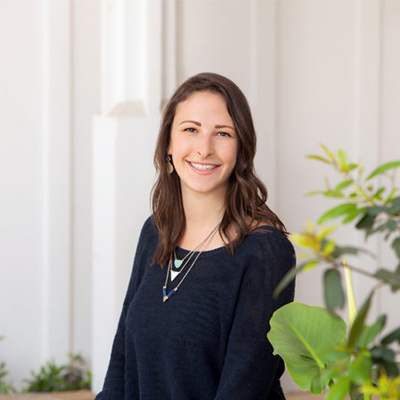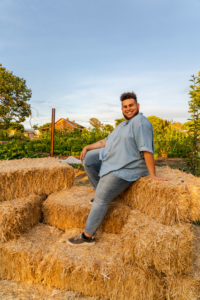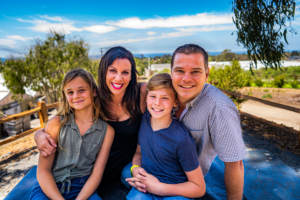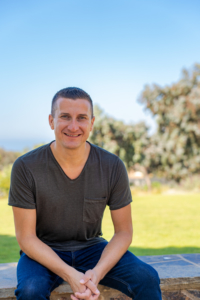The Hive’s Climate Change Commitment

Michelle Poliner, Events Manager
by Michelle Poliner, Events Manager
A few months ago, I attended Hazon’s annual Jewish Food Conference at the Isabella Friedman Center, their farm-to-table kosher retreat center in Falls Village, CT, where foodies from around the world convened to learn more about how we can apply Jewish values and heritage to identify solutions for climate change. For four days this question lingered in our minds: How do we take responsibility for fixing what has gone awry in our relationship to the Earth as it relates to the food system and Judaism?
With fully engaged minds and taste buds, we integrated this topic into workshops, cooking demonstrations, panel discussions, and dinner table conversations. I contemplated this question in relation to our operations at The Hive and Leichtag Commons, especially with Tu B’Shvat – the Jewish Festival of Trees – coming up, and I recognize we’re a leader for combating climate change in the Jewish world. Here’s why:
Eliminating Unnecessary Wastes
At the conference, Jeffrey Yoskowitz, co-founder of the Gefilteria, led a fascinating discussion around how the old-world Jewish concept of the ‘shtetl mindset’ can offer a present-day solution to limiting our food waste. This idea encapsulates the reintroduction of finding value in everything and not letting anything go to waste, using traditional Jewish food as a blueprint (for instance, matzah balls, which typically includes leftover animal fat and bread respectively). How are we applying the shtetl mindset here at Leichtag Commons?
- Our Hive Catering chef makes use of uneaten whole foods by pickling, preserving, and freezing and re–plating them for future events
- We donate most leftover catering meals to Hive members who willingly help divert them from the landfill
- Coastal Roots Farm composts much of the remaining food waste
Building Ecosystems
One of the many fascinating projects that takes place here is the development and ongoing growth of the 15-acre food forest managed by Coastal Roots Farm. This lush part of the property uses low levels of inputs to ensure long term balance between food production and the sustainability of natural resources. Through this process, soil quality is improved with higher levels of organic matter. This helps mitigate climate change by pulling carbon out of the atmosphere into the soil.
We’ve planted new trees and cared for them with Coastal Roots Farm for their Tu B’Shvat Food Forest Festival, which has become a celebration of ecological awareness and joy. This year’s festival theme “Trees of Change” is about honoring the role trees have in keeping our planet healthy. We see this, for example, in how the Food Forest sequesters carbon from the atmosphere and attracts an incredible diversity of wildlife, including red-tailed hawks, which now reside here on the Commons.
Supporting Local Farms
Much of the seasonal produce Hive catering obtains comes from right here at Coastal Roots Farm, where farmers are paid a livable wage and delivery is done on foot. When certain produce is not available here, we support other local North County farms such as Ashburner Farm, Wonderland Farm, and Cyclops Farms. Food transportation is certainly a contributor to climate change, and the shorter distance food travels to get to this property, the better environmental stewards we become.
Education Practices
At each Hive event we set out attractive waste bins with informational signage that helps guests better understand how to properly sort and dispose of their waste (whether it goes to landfill, compost, or recycling). The separated food waste gets picked up by the farmers and emptied into the vermicompost (worms) and compost piles at Coastal Roots Farm, where the Farm team teaches community members about our food system and how to take care of the land in the tradition of various Jewish agricultural practices. In this case, they talk about the importance of alternative waste streams that diverts food waste away from the landfill. This Leichtag Commons collaboration provides an educational outlet to future generations on how to better take care of the earth by experiencing it firsthand.
________________________________________________________________________________
I walked away from the conference refreshed and ready to tackle some of the hard questions knowing that while we are moving in the right direction, there is still a lot more work to be done. As Tu B’Shvat invigorates us with Jewish wisdom about how to care for trees, guidance about preserving the land, and ideas to combat climate change, and I want to explore that by initiating a collaborative Green Team at The Hive, which will be committed to reducing our negative footprint and increasing our positive impact in our pursuit of environmental justice on Leichtag Commons.



 Black, Jewish and Queer. These three identities weave the fabric of who I am, but it took a long time to believe that they could exist together.
Black, Jewish and Queer. These three identities weave the fabric of who I am, but it took a long time to believe that they could exist together. Lee and Toni Leichtag established the Leichtag Foundation in 1991 following the sale of their business. Lee and Toni were lifelong entrepreneurs with a passion for innovation and for supporting talent. They believed that only with big risk comes big reward. Both born to families in poverty, Toni to a single mother, they strongly believed in helping those most in need and most vulnerable in our community. While they supported many causes, their strongest support was for young children and the elderly, two demographics who particularly lack voice in our society.
Lee and Toni Leichtag established the Leichtag Foundation in 1991 following the sale of their business. Lee and Toni were lifelong entrepreneurs with a passion for innovation and for supporting talent. They believed that only with big risk comes big reward. Both born to families in poverty, Toni to a single mother, they strongly believed in helping those most in need and most vulnerable in our community. While they supported many causes, their strongest support was for young children and the elderly, two demographics who particularly lack voice in our society. Lifelong Baltimoreans, Rabbi George and Alison Wielechowski and their sons, 11-year-old Lennon and 9-year-old Gideon, are more than pursuing the good life in Southern California. Having moved to San Diego more than three years ago, they are fulfilling a lifelong dream.
Lifelong Baltimoreans, Rabbi George and Alison Wielechowski and their sons, 11-year-old Lennon and 9-year-old Gideon, are more than pursuing the good life in Southern California. Having moved to San Diego more than three years ago, they are fulfilling a lifelong dream.






 You would think that as the executive director of San Diego LGBT Pride, Fernando Zweifach López Jr., who uses the pronoun they, has done all the coming out they possibly can. A queer, non-binary individual who has worked for many years on civil rights issues, López also speaks openly and often about their father’s family, Mexican-American migrant workers who tilled the fields of rural California.
You would think that as the executive director of San Diego LGBT Pride, Fernando Zweifach López Jr., who uses the pronoun they, has done all the coming out they possibly can. A queer, non-binary individual who has worked for many years on civil rights issues, López also speaks openly and often about their father’s family, Mexican-American migrant workers who tilled the fields of rural California. Stacie and Jeff Cook understand commitment. They live it.
Stacie and Jeff Cook understand commitment. They live it.
